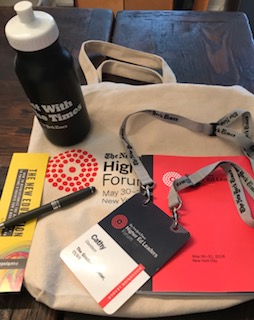I was honored and delighted to participate in the New York Times Higher Ed Leaders Forum, MAY 30-31, at the Time Center, NYC. I conducted one of the lunchtime sessions on the topic, “Designing Curriculum for the Digital Age.” Of course I offered participants a handout, and I’m reproducing it here for anyone who might find it useful. The brief, select, and pointed bibliography includes a handful of the books and articles I’m reading now to help me address the complexities and biases of the society we’re living in.
Today, I talked with wonderful colleagues at the Forum about the ways that
- higher education administrators need to create better policies and practices for using educational technology, buying technology, and allowing/disallowing technology purveyors to use student and faculty data;
- policy makers are long overdue in licensing and regulating standards for data mining, including developing responsible practices of the kind (but hopefully less bureaucratic) that social scientists and scientists use when interacting with and collecting data on human subjects (IRB and other practices);
- faculty must redesign curriculum such that “digital defensive driving” (careful thinking and practical applications about the role and use of technology in their field) is built into every part of the curriculum and that learning within disciplines takes new ways of disseminating information into account as part of its intellectual design; so that
- students can learn to think in a more sophisticated way about the relevant, safe, wise, useful, creative, and critical practices necessary to use technology wisely, deploy it well in their fields, and–for engineers and computer science majors–do a better job of designing better technology for all of us to use in the next generation;
- and so that all of us–students, faculty, administrators, and faculty–can realize that even our very best and finest journalistic news sources bend and sway when pushed by those powerful enough to control a certain kind of message, including (as danah boyd reminds us) those that are transmitted solely for the purpose of “casting doubt, fostering conspiracy, and strategically amplifying” certain messages and narratives (including by scriptural inference) and ignoring, suppressing, discrediting, or hiding others.
“Designing Curriculum for the Digital Age”
Cathy N. Davidson
The goal of making students “workforce ready” is shortsighted. No one can anticipate the specific skills a student today will need for the workforce of twenty years from now–or even ten years from now. Or even tomorrow. If we aim higher, at making students “world ready,” we can design a curriculum for the “digital age” that goes far beyond technology to consider an array of issues–from labor to democracy, from art to innovation, from equity to opportunity. Technology has had a tremendous (and tremendously varied) impact on all of these. If we want to rebuild the curriculum for a digital age, we can start with an inventory of the best higher education currently offers and then think about what new ways of thinking, creating, and building are crucial for the world we live in now.
Keywords: collaboration, leadership, creative thinking, critical practice, experiential liberal arts, prototyping past and present, critical technical practice, democracy, equity.
SOME PROVOCATIVE READINGS
Aoun, Joseph. Robot-Proof: Higher Education in the Age of Artificial Intelligence (2017)
Caplan, Robyn, et. al. “Algorithmic Accountability: A Primer” Data & Society (2018)
Davidson, Cathy N. The New Education (2017)
Davidson, Cathy N. “The surprising thing Google learned about its employees — and what it means for today’s students” The Washington Post (2017)
Marwick, Alice, and Rebecca Lewi. “Media Manipulation and Disinformation Online” Data & Society (2018)
Mattern, Shannon. Code and Clay, Data and Dirt: Five Thousand Years of Urban Media (2017)
Noble, Safiya Umoja. Algorithms of Oppression: How Search Engines Reinforce Racism (2018)
O’Neil, Cathy. Weapons of Math Destruction: How Big Data Increases Inequality and Threatens Democracy (2016)
Tufekci, Zeynep. Twitter and Tear Gas: The Power and Fragility of Networked Protest (2017)
Vaidhyanathan, Siva. Antisocial Media: How Facebook Disconnects Us and Undermines Democracy (2018)
